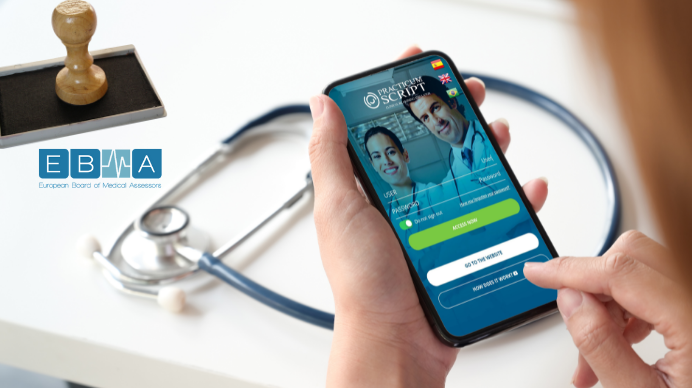
Following its goal of promoting best assessment practices in medical education, the European Board of Medical Assessors (EBMA) has recently signed an agreement to endorse Practicum Script as a valuable tool for developing superior cognitive skills for problem-solving during undergraduate medical training. The pedagogical model of Practicum Script, directed towards clinical reasoning training, was first audited in 2017, then tested in 2019, and has now been fully endorsed in 2021 after proving to be reliable and valid in the unique multicentre pilot study known as Practicum Universities involving more than 2,500 students across more than 20 universities.
Madrid - November 5, 2021. EBMA and the Practicum Foundation - Institute of Applied Research in Health Sciences Education have committed to work together to introduce in the curriculum of European medical schools effective approaches tailored towards the development of clinical reasoning skills. The agreement, signed in October 2021 by the managing director of EBMA, Dr Cees van der Vleuten, and the president of the Practicum Foundation, Dr Eduardo Hornos Barberis, refers to the online simulation-based programme Practicum Script as a learning methodology based on the principles of neuroscience, cognitive psychology and complexity sciences designed to improve the management of uncertainty in real clinical practice.
Both authorities agree that most tests delivered to medical students are excessively focused on rote memory. Practicum Script emphasizes the critical role of clinical judgement, embracing both analytical (reflective) and non-analytical (intuitive) processes to enable medical practitioners to gain experiential learning and develop meaningful knowledge in long-term memory. In the words of EBMA’s psychometrician, Carlos F Collares, “assessments based on memorization lack a high level of professional authenticity, and Practicum Script represents an antidote for this malady.” Practicum Script presents medical dilemmas to students to bring them closer to the real (medical) stage without posing any safety risks for the patient.
In 2017, EBMA audited Practicum Script in terms of methodology and content creation. The report concluded that Practicum Script is “compliant with the EBMA principles, which relates to the strategic use of assessment tools to enhance and foster learning”. Two years later, EBMA and the Practicum Foundation conducted a study on the implementation of Practicum Script into 21 medical schools across Europe, the US and Latin America. Preliminary results have shown the internal structure of Practicum Script to be very good in terms of reliability estimates and validity evidence.
Thanks to this new step forward, which also foresees new research protocols, medical schools associated with EBMA will be able to benefit from the programme under special conditions.
A new paradigm in undergraduate medical education
Practicum Script is the first simulator to include heuristics as part of the students’ learning process. Van der Vleuten describes this process as “an important step in which students are encouraged to generate hypotheses in free text, assign them a level of likelihood and justify their answer”. This allows students to develop clinical thinking skills in self-directed learning and, while interacting with peers, improve the quality of care that they provide.
Beyond the statistical patient and single-answer algorithmic solutions, Practicum Script helps students understand and weigh different plausible approaches. This simulator presents clinical challenges based on real cases with diagnosis, treatment and investigations, where students compare their decisions with those provided by dozens of international experts and the scientific literature. For Prof Collares, this represents “an unprecedented level of insight over the cognitive processes involved in decision-making”.
In short, the current clinical reasoning training programme consists of internal medicine cases created by an editorial board from Imperial College London and validated by renowned specialists from medical schools across Europe and America, including the University of Oxford, Harvard, the University of Exeter, David Tvildiani Medical University, and the University of Lodz, among others. In addition to individual student training, the simulator allows educators to access the students’ results throughout the entire training cycle and provide an optional resource to lead debriefing sessions.
More information about Practicum Script can be found at: universities.practicumscript.education.
Our personalized help center enables you to obtain technical support and help for navigating through the site and using the program.